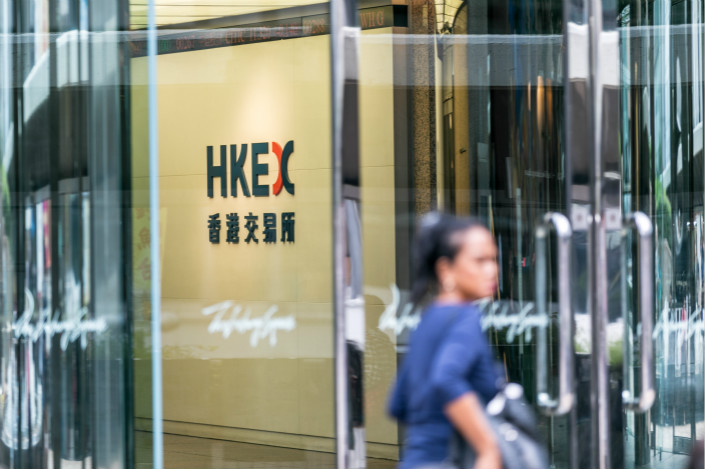Investment Manager Sees More Chinese Biotech Listings Coming to Hong Kong

The Hong Kong stock exchange’s new rules on initial public offerings (IPOs) by biotech companies could lead many in the sector to seriously consider a Hong Kong listing, a top investment manager told Caixin.
Zhang Leidi, managing director of China Life Private Equity Investment Company, a subsidiary of insurance giant China Life, recently spoke to Caixin about how the bourse’s plan to lift revenue and profit restrictions could affect the booming sector.
The Hong Kong stock exchange announced in December that it intended to allow pre-revenue biotech companies to list, a move that aims to attract more Chinese companies from an industry where profits are usually achieved only after long years of research and development.
This decision to relax the rules is “not a sudden move,” Zhang said. “It is an opportunity brought about by the greater circumstances.”
A large number of innovative biotech companies have sprung up in China over the past two years with the encouragement of the China Food and Drug Administration policies, Zhang said. However, because they don’t meet the profit requirements to list on the Chinese mainland stock exchanges, newer biotech companies’ only option is a U.S. IPO. However, Zhang said, this isn’t in line with the Chinese government’s wish to see homegrown businesses develop on Chinese stock markets.
In light of this, Hong Kong has been enthusiastically wooing biotech companies in recent months. In June, the bourse proposed setting up an over-the-counter stock exchange for new-economy companies, a plan it later pushed aside in favor of rule changes on its main board. And, in December, the exchange sent representatives to Taiwan in an effort to engage medical and biotech firms there.
Under the proposed new rules, biotech companies that aren’t making a profit must still fulfill a number of requirements, including a minimum expected market capitalization of HK$1.5 billion ($191.9 million). This won’t be a significant barrier for Chinese companies that have entered their B round of funding, because many are already valued at $200 million or more, Zhang said.
Without the help of a price-earnings ratio, investors will have to rely on nontraditional indicators to judge these companies, Zhang told Caixin. First of all, she said, investors must evaluate the company’s products and technical capabilities. Additionally, they should understand their products’ commercial potential, taking into account factors like target population.
This requires investors to have a deep understanding of the medical industry, since biotech companies’ research and product breakthroughs have a big impact on their share prices, Zhang said.
For example, when Hong Kong-listed Genscript Biotech Corp. announced on Dec. 11 that its subsidiary had received permission to conduct cancer immunotherapy trials, the company’s share price rose by over 20% that day, and continued to rise for the next month by nearly 140%.
After the Hong Kong stock exchange’s listing rules are relaxed, U.S. stock markets will remain enticing to biotech firms because the industry’s most advanced companies and most experienced investors are concentrated in the U.S. — an advantage that Hong Kong will need time to match, Zhang said.
Some biotech companies able to meet the old requirements have already listed in Hong Kong, including Wuxi Biologics Cayman Inc., which raised around HK$4.6 billion in its 2017 IPO. Zhang said this was one of the most successful IPOs ever on the Hong Kong stock exchange, giving a big boost to the performance of other biotech stocks in the city. But, Zhang pointed out, Wuxi’s parent company Wuxi Biologics is listed on the New York Stock Exchange, and international fund management companies are more familiar with it — so it remains to be seen whether other biotech companies listing in Hong Kong will be as sought after.
Nevertheless, Chinese biotech companies could be swayed by the higher proportion of mainland capital in Hong Kong, Zhang said. It’s easier for such firms to get recognition from other Chinese companies, so they may be able to achieve a higher valuation in Hong Kong.
Contact reporter Teng Jing Xuan (jingxuanteng@caixin.com)

- 1Luckin-Backer Centurium Capital to Buy Blue Bottle Coffee From Nestlé
- 2Cover Story: How China’s Growing Gig Economy Has Left a Generation Adrift
- 3In Depth: China’s Sweeping Banking Law Rewrite Targets Hidden Risks
- 4China Business Uncovered Podcast: A $15 Billion Bitcoin Seizure and the Fall of a Cybercrime Kingpin
- 5First Tanker Crosses Strait of Hormuz Since Iran’s Closure Threat
- 1Power To The People: Pintec Serves A Booming Consumer Class
- 2Largest hotel group in Europe accepts UnionPay
- 3UnionPay mobile QuickPass debuts in Hong Kong
- 4UnionPay International launches premium catering privilege U Dining Collection
- 5UnionPay International’s U Plan has covered over 1600 stores overseas






